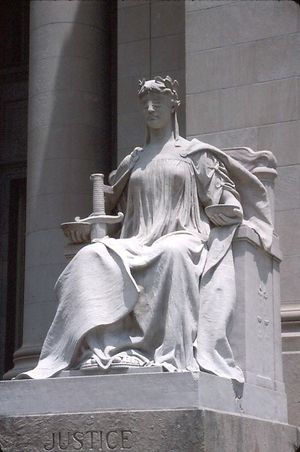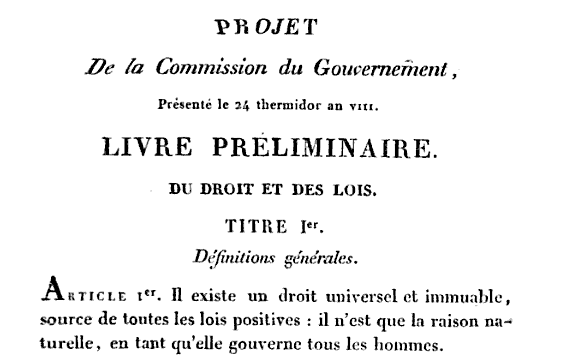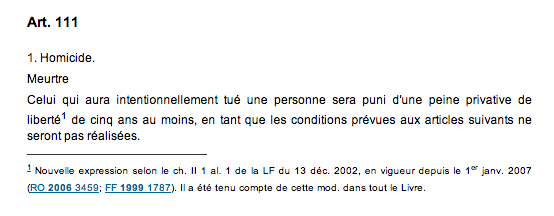Introduction to the Law : Key Concepts and Definitions
| Professeur(s) | Victor Monnier[1][2][3][4][5][6] |
|---|---|
| Cours | Introduction to law |
Lectures
- The definition of law
- The State
- The different branches of law
- The sources of law
- The great formative traditions of law
- The elements of the legal relationship
- The application of law
- The implementation of a law
- The evolution of Switzerland from its origins to the 20th century
- Switzerland's domestic legal framework
- Switzerland's state structure, political system and neutrality
- The evolution of international relations from the end of the 19th century to the middle of the 20th century
- The universal organizations
- European organisations and their relations with Switzerland
- Categories and generations of fundamental rights
- The origins of fundamental rights
- Declarations of rights at the end of the 18th century
- Towards the construction of a universal conception of fundamental rights in the 20th century
The law is the set of socially enacted and sanctioned rules of conduct that apply to members of society. The law is the set of rules that govern the relationship between men. Its function is to ensure the peaceful coexistence of the members of society within it. It is used to pacify relationships between individuals. Its purpose is also to organize society in order to protect the interests and property essential to living together. Law is the foundation of social order.
What is law?
The law in society
Society is the gathering of men living in groups under common rules. The human being is constantly in contact with his fellow human beings, he will provoke an infinite number of relationships with others.
- The organization of society, public constraint and the legal order
In any society, human beings are subject to constraints.
- "public" coercion:
- Public coercion refers to the power of coercion that belongs to the State authorities and, by extension, that is granted to the holder of a right in order to enforce it.
- "legal" order: The legal order consists of the rules imposed and sanctioned by law; it is the set of rules of law that govern both national and supranational entities (domestic law, international law).
- The function of law and social order
- In any society we know the existence of the right: a sanction punishes the violation of what is forbidden The State ensures the functioning of society: this implies rules of discipline ensured by an authority; these are clear prescriptions The law makes it possible to ensure peaceful coexistence. It serves to pacify the relationships of individuals, it is the foundation of the social order
- The purpose of the law is to organize and protect national interests. George Vedel attended the arrival of prisoners liberated from concentration camps at Gare de Lyon in 1944. He says: "I still don't know what the law is, but I now know what a lawless state is"[7].
The social order includes an organization that ensures the cohesion of society. It must provide the community with the satisfaction of its essential needs and be achieved through a balance between opposing interests and the different currents that flow through it:
- an organization that oversees the company;
- an authority that leads;
- ensure a material and intellectual subsistence;
- ensure a balance between competing interests;
- be in a state of constant adaptation (evolution of morals, spirit).
The multiple meanings of the word "Law"
The term " law " comes from the lower Latin directum, contrary to what is tortuous: it is what is in a straight line. The word "legal" refers to what belongs to the law (ius in Latin). It comes from the verb iubere which means "to order". The term iustus will give iusticia, namely "the just" and "justice".
- Objective law: a set of rules of conduct, socially enacted and sanctioned, that apply to members of society.
- Subjective right: is an individual prerogative recognized and sanctioned by objective law that allows its holder to do, require or prohibit something in his own interest or, sometimes, in the interest of others.
- Positive law: it consists of all the legal rules in force in a State or in the international community at a given time. It is the "settled" right, the right as it really exists. (objective law and subjective right)
- Natural law: Natural law is law based on an order of eminent values (ideal justice, moral duty); it constitutes a set of principles of justice, resulting from nature and/or reason, which is considered as the inspiration or complement to positive law. These are rules that are superior to the rules of positive law; they are based on and serve as a reference. They are rules that inspire positive law, because they announce higher principles of justice, a set of unwritten values and principles.
The French Civil Code of 1804 was conceived according to the idea that after the revolution it was good to establish a civil law applicable to all and all regions of France. It governs relations between individuals and applies to all French people regardless of the region in which they live.
Article 1 proclaimed "There is a universal and immutable law that is the source of all positive laws, it is only natural reason inasmuch as it governs men".
Even if this title has not been retained in the final version of the French Civil Code, it will still have an influence throughout Europe under French domination. When Geneva was the prefecture of the Department of Lake Geneva, the French Civil Code also applied to Geneva residents. As for the Jura, which had been annexed by France, it kept Napoleon's code under French domination and has always kept it since it was annexed to the canton of Berne.
For positivists, natural laws that are not recognized by a rule of positive law cannot influence the judge. Whether he is a lawyer, a consultant, a legislator or a lawyer: there is only positive law. Natural or moral laws are not mandatory unless they have been sanctioned by a rule of law. Therefore, these natural laws that are not incorporated into positive law cannot influence the judge.
Today, in the Constitution, there is a whole principle of freedom and equality. This was part of natural law 150 years ago and is now an integral part of positive law.
Particular attention must be paid to positive law/natural law.
The rule of law
The rule of law or legal rule is the rule of conduct in social, general, abstract and obligatory relations, the sanction of which is ensured by the public authority. The law is a set of rules of law.
The distinction between public and private law
The mandatory, general and abstract nature
- Mandatory character: appears clearly
- General character: governed by an indeterminate number of persons
- Abstract character: applies to an indefinite number of situations
The coercive nature: implies a constraint
Any legal rule guarantee a sanction by the public authority. The public authority, or public authority, refers to the organs of the State, which are the instruments, the machinery, that assume the functioning of the State.
Religious rules have no authority over the rules of law, but some rules have been incorporated into Swiss positive law (ex- you will not kill). Thus, they can become positive law.
Ex- article 111
The Elements of the Rule of Law
A set of legal rules forms a legal institution that aims to shape a fundamental social relationship. This is for example the case of marriage or adoption.
The factual situation
A factual situation is a conditional subordinate proposal indicating the conditions for the application of the rule; the factual situation of a judgment sets out the relevant facts (the parties involved, a chronological account of the facts leading to the dispute, the steps in the procedure and the parties' requests or submissions).
Example: "the one who intentionally killed".
The dispositive
- The dispositive part is a main proposal indicating the legal effect which may consist of a prohibition, an obligation to do or an obligation not to do Example: "shall be deprived of a custodial sentence of at least 5 years".
- The dispositive is also the part of a judgment that contains a decision itself, i.e. the part in which the court rules on the parties' claims (or submissions).
Dispositive or supplementary or declaratory rules
The dispositive or supplementary or declaratory rules are those that apply in the absence of rules adopted by individuals. Only applicable if individuals have not decided to do otherwise.
Mandatory rules
Mandatory rules are the rules that are absolutely necessary for the respect of all those to whom they are addressed
Annexes
- Code Civil des français de 1804
- Université de Genève. “Introduction Aux Droits De L'Homme.” Coursera, https://www.coursera.org/learn/droits-de-lhomme.
References
- ↑ Publication de Victor Monnier repertoriées sur le site de l'Université de Genève
- ↑ Hommage à Victor Monnier sur le site de l'Université de Genève
- ↑ Publications de Victor Monnier sur Cairn.info
- ↑ Publications de Victor Monnier sur Openedition.org
- ↑ Page personnelle de Victor Monnier sur le site de l'Université de Aix-Marseille
- ↑ En Hommage À Victor Monnier.” Hommages.ch, 11 Mar. 2019, www.hommages.ch/Defunt/119766/Victor_MONNIER.
- ↑ B. Beignier et C. Bléry, Manuel d’introduction au droit, P.U.F., Paris, 1 re édition, 2004, p. 15.


